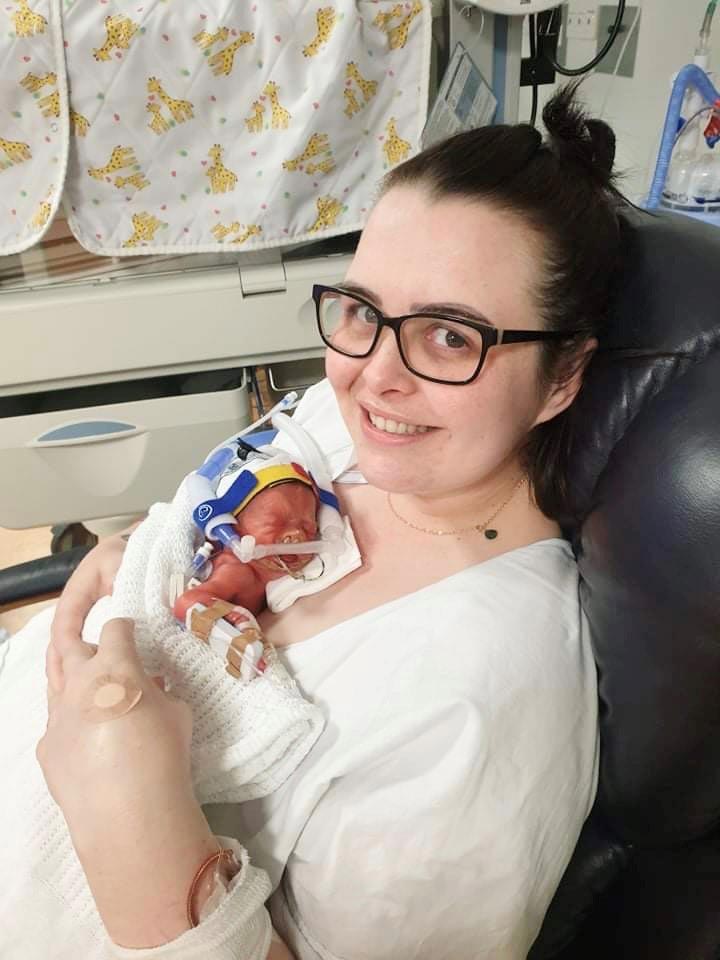King Edward Memorial Hospital leads the way in preeclampsia prevention
 Jessica and Charlotte
Jessica and Charlotte
King Edward Memorial Hospital (KEMH) is rolling out early pre-eclampsia screening to reduce the risk of maternal illness and preterm birth from this severe complication of pregnancy.
Obstetricians at KEMH can now offer a new pregnancy screening test in the early weeks of pregnancy which predicts pre-eclampsia or high blood pressure in pregnancy, a condition that causes serious complications and premature birth.
KEMH obstetrician Jan Dickinson, a Professor of Maternal Fetal Medicine at The University of WA said screening for pre-eclampsia is an important addition to the medical treatment used to reduce preterm birth and improve outcomes for pregnant women.
Pregnant women will be offered pre-eclampsia screening from 11 to 14 weeks of gestation using a combination of blood pressure assessment, specific laboratory blood tests and an ultrasound assessment of blood flow in the pregnant woman’s uterine arteries.
“If the screening program produces an increased risk for early onset pre-eclampsia, the patient will be advised to commence low dose aspirin daily until 36 weeks of gestation,” Jan said.
“Scientific studies have demonstrated a significant reduction in early onset pre-eclampsia if low-dose aspirin is commenced prior to 16 weeks of gestation in women recognised as at increased risk at this screening assessment.”
Pioneered in the United Kingdom, the pre-eclampsia screening is being introduced in Western Australia at KEMH, under the umbrella of the national Preterm Birth Prevention Alliance.
It is hoped this groundbreaking screening program will soon be rolled out Australia-wide.
“Screening pregnant women for early-onset pre-eclampsia is an important addition to the successful preterm birth prevention goals of the Australian Preterm Birth Prevention Alliance, a national program to implement change and reduce preterm births,” Professor Dickinson said.
Australian Preterm Birth Prevention Alliance Chair Professor John Newnham said we expect the preeclampsia screening will have a very beneficial effect in further reducing preterm birth rates.
“Preeclampsia is very common and its potentially very serious, but the only treatment is to deliver women with the condition early, and that can be as early as 24 weeks gestation,” he said.
Mum Jessica (pictured) is very aware of this complication, her daughter Charlotte was born at 28 weeks. Without warning, Jess was rushed to hospital as she reported limited movement that day from her unborn baby.
“Despite the extreme stress of the situation, I felt I was in really safe hands with the doctors and nurses at King Eddies. Their professionalism and clear information they were giving me was helping me stay as calm as possible,” Jessica said
“We feel very grateful to have had such good outcomes, and while there have definitely been challenges and hard times along the way, we have our beautiful girl home healthy with us. That is the best outcome we could have ever asked for.
“I have been passionate about raising awareness of preterm birth. If our story can help other families notice signs and symptoms and get checked early, I hope it means that it can help them have better outcomes.”
The Australian Preterm Birth Prevention Alliance was first launched by The University of WA and KEMH in 2014 to safely lower rates of early birth.
The program has seen preterm births at King Edward Memorial Hospital reduced, prompting the Australian Preterm Birth Prevention Alliance to be formed and rolled out across the country in 2018.
For more information on being tested for pre-eclampsia visit the Preterm Birth Prevention Clinic.

